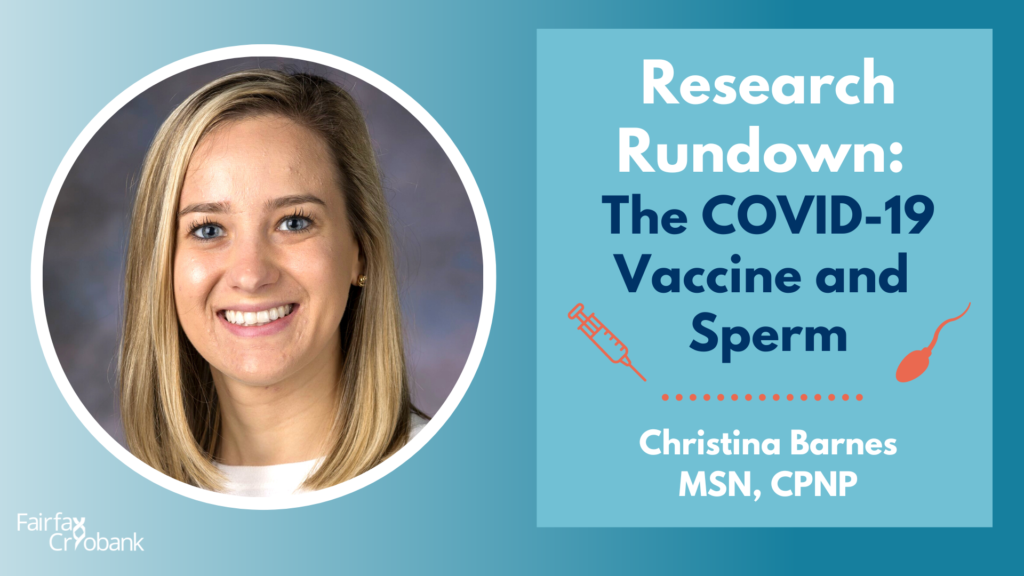Research Rundown: The COVID-19 Vaccine and Sperm

Does the COVID-19 vaccine affect a man’s sperm? Are you (or your baby) at risk if you use sperm from a man who has been vaccinated? The short answer to these questions is no, but you aren’t the first to ask.
During the COVID-19 pandemic, teams of scientists worldwide created studies to examine a man’s sperm before and after receiving the COVID-19 vaccination. Fortunately for those interested in sperm health, those studies generated a lot of valuable data about sperm and the COVID-19 vaccine.
Organizations like the American Society for Reproductive Medicine (ASRM), the American College of Obstetricians and Gynecologists (ACOG), and the Centers for Disease Control and Prevention (CDC) analyze research studies to generate vaccine guidelines for those interested in pregnancy or fertility.
These guidelines are created by experts who consider all the available research and develop recommendations. These organizations, along with many others, recommend that men and women receive the COVID-19 vaccine even if they are trying to become pregnant, are already pregnant, or are breastfeeding.
It’s reassuring that these groups of doctors and scientists recommend the COVID-19 vaccine for those wanting to build a family. But what does the data show about sperm numbers, sperm quality, and creating a baby with sperm from someone who has received the COVID-19 vaccine?
Let’s review the data.
Sperm Count, Concentration, and Motility
According to multiple studies, sperm count, and sperm concentration actually increased in men after receiving the COVID-19 vaccine. Total motile sperm count, and total volume of ejaculate also increased.
The studies reported no damaging effects on the amount and quality of sperm. All the men studied maintained their ability to produce sperm, and most saw increases in the amount of ejaculate.
Fertility
ASRM, the CDC, and many other medical organizations agree that the COVID-19 vaccine does not impact fertility in men or women.
COVID-19 vaccines are safe for pregnant women, those planning to become pregnant, or those currently breastfeeding. There has been no evidence that the COVID-19 vaccine reduces male or female fertility, and the vaccine has not been shown to harm sperm quality.
Research into this area is ongoing, but ASRM notes that many people have gotten pregnant since receiving the COVID-19 vaccine.
Being infected with the COVID-19 virus, on the other hand, has been shown to decrease male fertility for up to 2 months after infection.
DNA
Sperm is one-half of the genetic material required to make an embryo, and there is no data to show that any of the COVID-19 vaccines alter this genetic material in any way. The COVID-19 vaccine does not alter a person’s DNA.
COVID-19 vaccines do not enter the nucleus of a person’s cells. The nucleus is where DNA exists, and as a result, these viruses cannot cause any genetic changes. The vaccines bring information into the person’s cells showing how to build immune cells against COVID-19. Once the vaccine shares that information with the human cell, the body breaks down the vaccine.
Other Vaccines
If you’ve received other vaccines in your lifetime, chances are they function like the COVID-19 vaccines. There is no data that other vaccines, such as the flu vaccine, reduce fertility or cause problems in offspring.
Pfizer and Moderna COVID-19 vaccines are mRNA vaccines. Other mRNA vaccines commonly used include the flu vaccine, the cytomegalovirus (CMV) vaccine, and the rabies vaccine.
The Johnson & Johnson COVID-19 vaccine is a viral vector vaccine. Ebola vaccines use the same technology and have been approved for use worldwide.
The Novavax COVID-19 is a protein subunit vaccine. The hepatitis B and whooping cough vaccines are also protein subunit vaccines.
The Guidelines
Making decisions about your reproductive health and your baby’s health can be overwhelming, especially during COVID-19. Fortunately, the data shows that the COVID-19 vaccine does not impact male fertility, sperm quality, or DNA. The data also shows that while a decrease in male fertility may be seen for about two months after COVID-19 infection, this doesn’t seem to be a long-lasting complication.
If you’re interested in reading the guidelines and going deeper into the data, check them out here:
American College of Obstetricians and Gynecologists (ACOG): COVID-19 Vaccination Considerations for Obstetric-Gynecologic Care
American Society for Reproductive Medicine (ASRM): COVID-19 FAQs for Current and Future Fertility Patients
Centers for Disease Control and Prevention (CDC): COVID-19 Vaccines for People Who Would Like to Have a Baby
Centers for Disease Control and Prevention (CDC): Understanding How COVID-19 Vaccines Work







